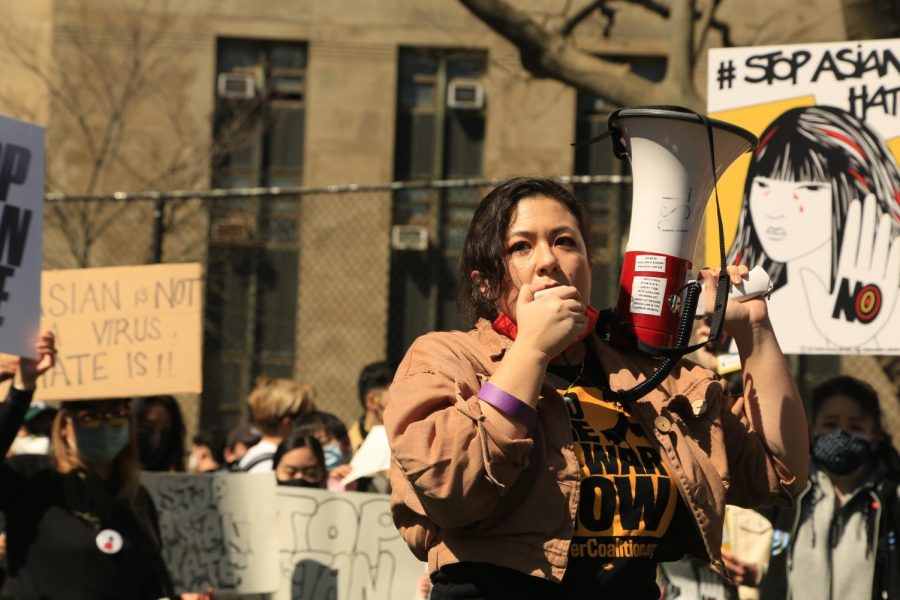Opinion: The COVID-19 Hate Crimes Act aids and abets a racist policing system
This bill does not effectively address the recent rise in hate crimes against Asian Americans. It will simply increase harmful policing that most negatively impacts Black and other communities of color.
A community leader speaks out against Asian hate crimes during a protest. The U.S. Senate has passed a bill that attempts to address the rising tide of these hate crimes. (Photo by Suhail Gharaibeh)
May 3, 2021
On Thursday, April 22, the U.S. Senate passed the COVID-19 Hate Crimes Act. The Act passed 94-1, sweeping the narrowly divided Senate floor in a near-unanimous decision. The Act, if passed through the House of Representatives and signed into law by President Joe Biden, would designate an official at the Justice Department to oversee the expedited review of hate crimes reported during the pandemic. The bill would also require the department to work with local law enforcement groups and community organizations to increase hate crime reporting efforts. This would include the establishment of an online hate crime reporting database in multiple languages. Notably, the bill would “provide grant money to law enforcement agencies that train their officers to identify hate crimes.”
In wake of tragic anti-Asian hate crimes, this bill is a victory to many politicians. Sen. Mazie Hirono (D-Hawaii) said, “We will send a powerful message of solidarity to the AAPI community that the Senate won’t be a bystander as anti-Asian violence surges in our country.” New York’s own U.S. Rep. Grace Meng (D-Queens), stated that increased reporting of hate crimes would “provide [for] increased data and a more accurate picture of the attacks that have been occurring against those of Asian descent,” which would help law enforcement take action against perpetrators.
Activists on the ground, however, see the threat that legislation like the COVID-19 Hate Crimes Act poses. “The ‘George Floyd Act’ and ‘Anti-Asian Hate Crime Bill’ still operate with incentives to reform policing. Reforms are not progress when the goal is to abolish the systems that are killing us,” musician Jordan Occasionally tweeted. Asian and Black American activists have demanded police abolition in wake of the tragic and violent deaths of George Floyd, Breonna Taylor and now Ma’Khia Bryant. These hate crime bills are not asking for defunding or abolition: instead, they ask for the system to hold itself accountable. Ultimately, this means more tax-funded grants that do nothing but encourage policing.
Some even compare the quick passage of this act to the decades-long fight for anti-lynching legislation. They identify a crucial difference between the goals of countless anti-lynching legislative efforts of the past to the goals of the COVID-19 Hate Crimes Act. Many attribute this quick response to the complicit nature of the new legislation. While anti-lynching efforts would focus on bolstering community resources, reparative payments and police abolition, the COVID-19 Hate Crimes Act prioritizes none of those things.
It’s no secret that government grants are correlated with increased police presence. However, it is also no surprise that this increase in funding does little to actually prevent crime of any kind. Activists and community organizers have minimal faith that the new bill’s expansion of the Justice Department — which has its own recent history of racism — and subsequent expansion of local law enforcement agencies will change much.
Before the passage of the COVID-19 Hate Crimes Act, Shaw San Liu, executive director of the Chinese Progressive Association, stressed the importance of intercommunity partnership and collaboration. “For the Chinese community to be able to be safe in every sense of the word, we have to be working in partnership with other communities of color across the region,” Liu said.
Working with other communities of color, particularly Black Americans, means acknowledging the ways police continue to harbor racist and anti-Black sentiments that manifest in the form of disproportionate violence. Any solution to the hatred the Asian community faces must take into account the racialized harm police inflict — and divest from policing entirely. Sadly, the COVID-19 Hate Crimes Act falls horribly flat. Instead of looking to the government, we must prioritize and celebrate the work of activists looking to build a safe future for all communities of color.
Opinions expressed on the editorial pages are not necessarily those of WSN, and our publication of opinions is not an endorsement of them.
A version of this article appeared in the Monday, May 3, 2021 e-print edition. Email Srishti Bungle at [email protected].




























































































































































